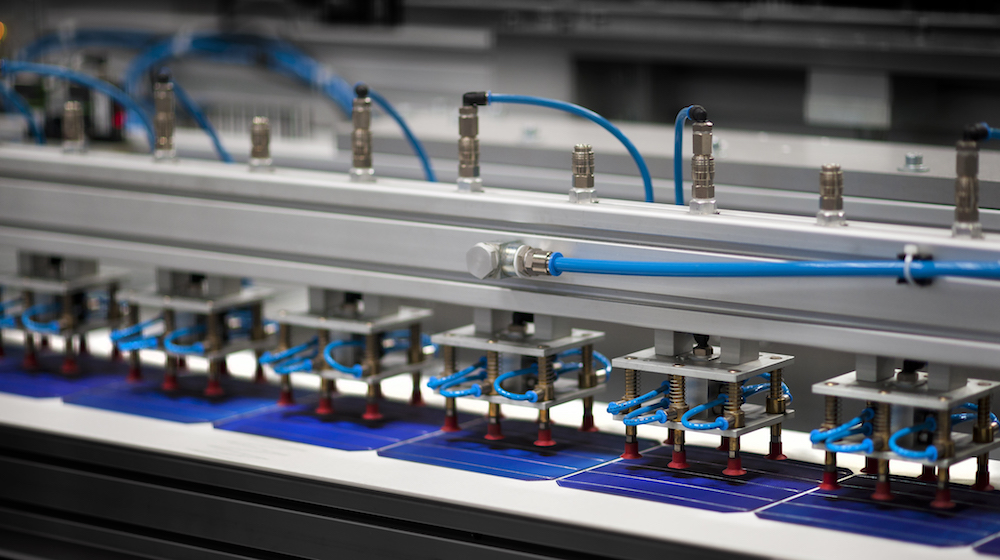By Jeff Ferry, CPA Research Director
SolarWorld Americas is ramping production of solar cells at its Hillsboro, Oregon facility.
CEO Juergen Stein tells us that the company is aiming to add another 300 employees before year’s end, which would bring its total US workforce to 600 people.
“We are already hiring,” Stein said. “We are running at around 50% of capacity today and we want to be back up to 100%.” Full capacity of the Hillsboro fab is 450 megawatts of solar cells.
SolarWorld was one of two companies that took China’s solar manufacturers to the US International Trade Commission and won their case, with President Trump’s January decision to slap 30% tariffs on imported solar cells and modules. SolarWorld’s German parent company is in insolvency and negotiating with potential buyers interested in the US division. Press reports have said that negotiations are ongoing, with five separate parties interested in acquiring ownership of SolarWorld Americas. Stein said he can’t comment on the confidential negotiations. But he seems optimistic a new owner will be announced soon. “I’m very confident that we will have a good setup for producing in America, having an American brand, and creating more American manufacturing jobs,” he said. “That’s what we have been fighting for these last couple of years.”
SolarWorld’s decision to ramp up cell production is significant. As of now, it is the only solar cell producer in the US. Photovoltaic silicon solar cells are the key building blocks of solar power systems. Cells are assembled into modules or panels, which are then mounted on roofs or elsewhere and attached to an electric system. As we reported last month, about a dozen US-based companies are planning to increase, or are already ramping up, their module production, but SolarWorld is the first to ramp up cell production. Chinese-owned JinkoSolar has said it will invest $50 million in a Jacksonville, Florida facility, but it’s unclear if that will include cell production or module assembly of imported cells.
Buy American for Solar
Stein said the tariff decision—recommended unanimously by all four members of the US International Trade Commission, and then ratified by the President—was useful but more can be done. “It was very helpful to get the decision from the president. It will help us and help others.”
Stein identified two other policy moves that could help the industry: better enforcement of Buy American rules, and a decision to recycle duties from earlier solar industry trade actions back to the industry. Existing Buy America legislation does apply to federal spending on solar installations, Stein said, but because many solar projects involve selling power to multiple customers, installers often can skirt the rules. “We see Chinese solar panels on military sites, on veteran sites, even on the Pentagon. We should close those loopholes.” Stein estimated federal investment in solar is running at about 1 Gigawatt of solar power a year, making it some 10% of the total US market.
Stein has also asked the federal government to take a portion of the antidumping/countervailing duty revenue from two earlier solar trade cases and find ways to use those funds to benefit the industry. The Coalition for a Prosperous America supported a similar idea in an earlier article. Stein suggests that the revenue go to the manufacturers to help them rebuild capacity. We suggested it be split with installers to help offset price increases in solar systems that may follow the imposition of tariffs, and help unite the industry in support of government trade action aimed at building a vertically integrated US solar industry. US Trade Representative Robert Lighthizer has been asked by President Trump to consider SolarWorld’s proposal regarding duty revenue.
Despite fearmongering by solar installers and foreign-based manufacturers before the tariff decision, there is so far no sign that the solar industry is entering a slump. Leading solar installer Vivint Solar reported quarterly results last week, with Q4 revenue up 60% to $66.8 million. Vivint’s CEO told investors that he is confident Vivint revenue will rise this year—even as the company is taking action to reduce the number of solar deals it signs that are supported with bubble-style lease financing.
Stein echoed that industry optimism. “This is a robust industry. We see many promising announcements of bigger projects and residential projects. It will be another strong year this year. And so will next year.”













